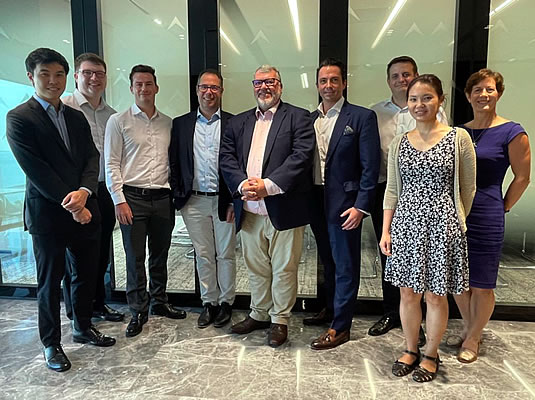
As in-force and legacy business develops in the APAC region, having a voice as the legacy market, as well as sharing best practice around managing and transacting on legacy business, is becoming increasingly important.
Utilising the knowledge and services of an experienced UK based legacy association to encourage the APAC market to interact with and learn more about the benefits which legacy professionals can provide.
The Association committee structure exists for the benefit of members to discuss and review activities in a specifically relevant market sector and/or geographic area. All committee members have technically relevant knowledge to both bring issues to the committees attention and to facilitate relevant responses.
IRLA APAC membership application
- Following relaxation on foreign direct investment (FDI),
foreign insurers are restructuring their market approach - Reserve sizes are growing but little run-off activity to date
- Liberalization of foreign reinsurers
- Banks are expected to lower their stakes in insurance subsidiaries, potentially
triggering a wave of M&A (especially if in conjunction with the FDI cap being lifted) - Motor third party liability (TPL) is driving the long tail reserves (slow court
settlement) - Increasing volume of claims generating a lot of reserves on shorter lines
(health and crop)
- South East Asia includes a diverse range of
needs and experience
with run-off deals - Singapore and Malaysia statutary transfer mechanisms are tried and tested
- Malaysia large claims reserves mainly from Motor TPL (unlimited
cover combined with slow court settlement)
- Mature market but conservative in business transfers
- High property cat business
- Long tail businesses likely to be more capital
intensive from introduction of K-ICS risk based
capital framework
- Mature market with sophisticated, tried & tested
transfer mechanisms - Risk Based Capital framework has come
into force in 2024, leading to enhanced capital
requirements - Multinational insurers exiting unprofitable lines
of business - Lots of smaller companies and large stock of
claims reserves, that may push some to consider
exiting the market
- Long tail compulsory third party liability (CTP) classes
with reduced profitability after Royal Commission. - Struggling workers’ compensation (WC) businesses for
some insurers
Singapore Roundtable
Welcome
A key part of our intention and focus at IRLA is providing the stage and opportunity for people across the sector to come together and express views, share insights and experiences.
On June 15 2023, a diverse group representing re/insurance carriers, run-off portfolio acquirers, claims handling third parties, brokers and legal firms – all of whom with first hand experience of Asia legacy business – came together to discuss the current state of the Asia legacy market. Below is a summary of some of the key points from that discussion.
We hope this helps IRLA members better understand the dynamics of the Asia legacy market as it stands, and gives a sense of the landscape in which we operate.
We value your opinion, and we seek to provide as much insight as possible so please do get in contact.


If you are interested in learning more, or have colleagues based in Asia, do please get in contact with us at kim.barker@irla-international.com
You can also call the UK office on +44 7464 113651 and ask for Kim.
The current state of legacy business in Asia:
- What legacy market! The big picture is that there is a lack of activity vs other regions, notably UK/EMEA/US.
- Portfolios tend to be smaller and shorter tail, with the exception of ANZ which behaves more like the US/UK. Court processes are long, so there is a high incentive to settle early. It was observed that legacy options become more attractive as litigation risk increases, which it does as court processes speed-up. We should consider whether any markets are moving to allow class actions and litigation funding.
- Having said that, there has been some transactional activity, especially in ANZ, Hong Kong, Singapore and Malaysia. An increased cost of capital environment helps, with Risk Based Capital and IFRS17 preparations bringing more transparency to reserve development and capital intensity. However, with shorter tail business in Asia (ex ANZ), premium risk tends to be the main driver of capital requirements, rather than reserving risk.
- For a legacy deal concerned with reserving risk and associated capital, the portfolio needs a high enough net retention, often not the case in Asia.
 A key theme of the limited amount of activity has also been disposal and M&A related. For example as part of a broader transaction, rather than a concern for reserving risk typically found in other markets.
A key theme of the limited amount of activity has also been disposal and M&A related. For example as part of a broader transaction, rather than a concern for reserving risk typically found in other markets.- Not many of the typical acquirers are based here, likely due to lack of activity to date, and also for licensing and operational reasons, given the diversity of Asia jurisdictions.


Claims trends driving Asian legacy business
- Are tails lengthening? Not obvious or rapidly, but directionally this is likely to be the case. Societies most likely to get more litigious, not less.
- No obvious worrying claims trends for Asia ex ANZ, where ANZ have topics such as Silicosis and Molestation.
- Asbestos could be one for Asia ex ANZ, as it continued to be used for years after UK/US stopped using, but claims trends have not materialised to date.
- Molestation claims remains quiet for much of Asia, although we couldn’t rule this out either, given the prominence of the topic elsewhere in the world.

The challenges associated with legacy business
- The key challenge to more transactional activity is familiarity, amongst the market and some regulators.
- There is also potentially a pride or cultural aspect of legacy business signaling a failure, rather than it being part of a healthy lifecycle of insurance.
- Cross border transactions are also difficult due to the regulatory diversity.

To what extent would you see value in further market & IRLA collaboration for legacy?
- To a large extent, particularly around the topics we’ve discussed, i.e. creating familiarity amongst the whole market, including regulators, with legacy and associated products to support the re/insurance sector.
- The recent insolvencies in Thailand are a good example of where legacy market collaboration could have helped.
- There is a broad network of relevant parties that IRLA could bring together to encourage best practice in legacy management in Asia.
Transparency of transactional activity
- There is an absence of public disclosure around the existing deals, so transparent information is hard to come by. More awareness would create comfort amongst the whole market, including for regulators.
- Further case studies of deals, whether anonymous, or where led by the sell side, would help with this.



